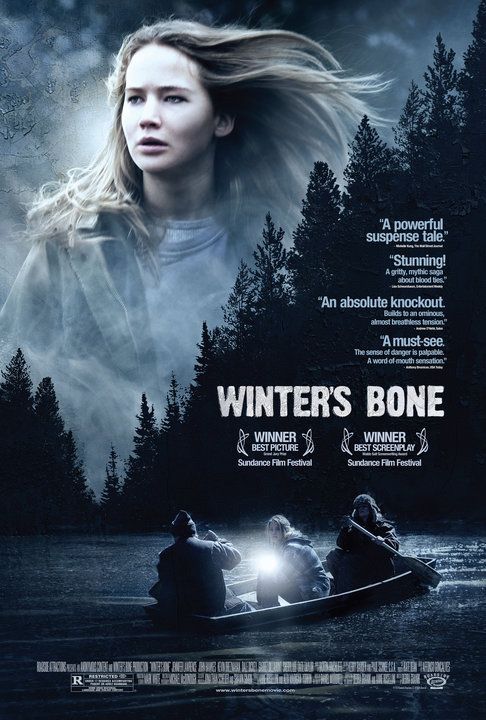 WINTER’S BONE (2010, directed by Debra Granik, 100 minutes, U.S.)
WINTER’S BONE (2010, directed by Debra Granik, 100 minutes, U.S.)
BY DAN BUSKIRK FILM CRITIC
As direct as a great John Ford western, Sundance Grand Jury winner Winter’s Bone flies in the face of everything that has been hollowed out and trite in American indie films over the last decade. Contrast it with Nicole Holofcener’s recent indie hit, the critically-lauded Please Give. That film chronicles a little bump in the lives of vaguely disaffected privileged New Yorkers. The character’s mildly dramatic detour, flirting with guilt and infidelity hardly seems like the most interesting thing that happened to them this month, let alone an integral moment in their lives. It is storytelling absorbed in the frivolous and allergic to drama, everything Winter’s Bone is not.
Director Debra Granik boils its story down to its core: a seventeen year old girl named Ree must find her bail-jumping, meth-cooking daddy before the law throws her and her helpless family out of their house. It is a film that could be called many things, a rural drama, a coming-of-age story but perhaps the tradition that it fits best in is that of a detective drama, with our dogged and vulnerable Ree revealing the lay of the land in this harsh Missouri Ozarks community as she follows her wayward Dad’s trail into the swampy meth underground.
Over the years I’ve been critical of the portrayal of the economically-deprived (or “the small people” as BP exec Carl-Henric Svanberg might describe them) in American films, they’re usually either noble salt-of-the-earth types or craven animals, yet Winter’s Bone finds the humanity in its characters, even when drugs and poverty might have reduced them to their lowest. The film is such a beautifully sustained piece I hesitate to single out performances but one must point out Jennifer Lawrence’s unsentimental performance as Ree, the girl at the center of the story. Her responsibilities to care for her mother and two young siblings do not allow her to go soft and breakdown so she keeps her emotions clenched inside of herself, the strain of her situation seen only fleetingly. The scenes of her teaching her younger brother how to hunt and eat a squirrel, a skill the family might desperately need if her journey turns fatal, reveal the character’s soft yet film demeanor. It’s beautifully un-showy work. Dale Dickey is also stunning as the cold-hearted wife standing between Ree and her father’s fate, leaning in her home’s doorway, she’s guardedly frustrated by Ree’s demands. “Don’t you have some men folk to do this for you?” she sighs. And John Hawkes, Miranda July’s dreamboat in the memorable 2005 comedy You And Me And Everyone We Know, is haunting as Ree’s semi-heroic uncle, Teardrop. He’s bone thin and trapped in a meth nightmare yet some humanity seems like it might be rustling around inside of him, maybe.
The people that inhabit this world live and breathe with an authenticity rarely seen in American film and the richness of this unseen terrain wold probably be enough to sustain the feature. But Winter’s Bone rises to its own ambitions and climaxes with a beautifully metaphoric and very real scene in which Ree finally cuts herself loose of the burdens of being her father’s daughter. There’s a huge bounty of super hero sequels waiting for film-goers this summer but Debra Granik has given us a haunting classic that delivers a thrilling and intimate adventure that feels truly blockbuster big.
